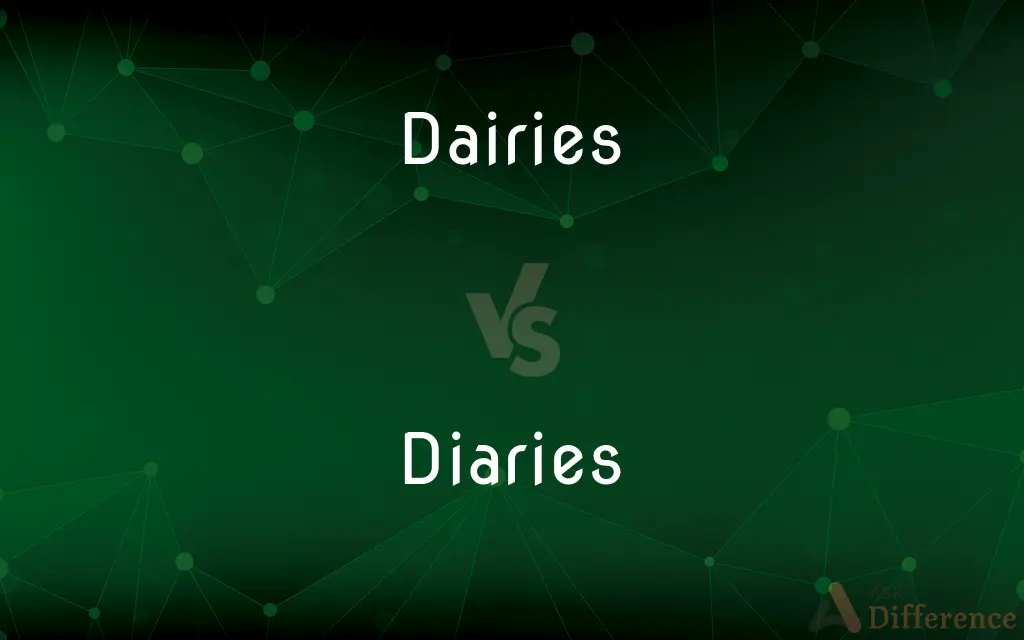Dairies vs. Diaries — What's the Difference?
By Fiza Rafique & Maham Liaqat — Updated on May 2, 2024
Dairies are facilities where milk and its products are produced and processed, while diaries are personal journals for recording daily events and thoughts.

Difference Between Dairies and Diaries
Table of Contents
ADVERTISEMENT
Key Differences
Dairies primarily refer to establishments focused on the production, storage, and distribution of milk and dairy products, such as cheese and yogurt. On the other hand, diaries are books or digital mediums where individuals document their daily experiences, thoughts, and observations.
In dairies, the environment is tailored for handling animal milking and processing milk into various products, ensuring hygiene and efficiency. Whereas in diaries, the emphasis is on privacy and personal reflection, often featuring dated entries that allow users to track their thoughts over time.
Dairies play a crucial role in agriculture and food industries, contributing significantly to local and global economies. Conversely, diaries serve more personal functions, aiding in memory retention, emotional expression, and sometimes even historical documentation.
Technological advancements have transformed both fields: dairies have embraced automation and advanced preservation techniques to enhance productivity. Meanwhile, diaries have evolved from traditional paper formats to digital apps and platforms that offer encryption and cloud storage.
While dairies must comply with strict regulatory standards to ensure public health and safety, diaries are bound by few rules, primarily concerning privacy and data protection in digital formats.
ADVERTISEMENT
Comparison Chart
Definition
Facilities for producing and processing dairy products.
Personal journals for recording daily events.
Primary Function
Production and distribution of milk and dairy products.
Documentation of personal experiences and thoughts.
Key Regulations
Food safety and animal welfare standards.
Privacy and data protection laws (for digital).
Technological Use
Automation in milking and processing.
Digital platforms for entry and storage.
Cultural Significance
Integral to food industry and agriculture.
Associated with personal growth and historical record.
Compare with Definitions
Dairies
An establishment for the industrial production of milk products.
He works at a dairy that produces artisan cheeses.
Diaries
A personal journal used to write daily events and feelings.
She writes in her diary every night before bed.
Dairies
A section in a store selling milk-based products.
You can find butter and yogurt in the dairy section.
Diaries
An intimate form of self-expression through writing.
Keeping a diary helps him process his thoughts.
Dairies
A business entity that deals in milk and its derivatives.
The dairy industry has seen significant growth this year.
Diaries
A book with dated pages for recording personal experiences.
His diary was filled with notes and sketches from his travels.
Dairies
A commercial establishment for processing or selling milk and milk products.
Diaries
A tool for historical documentation of personal life.
Her diaries were used as a primary source for the biography.
Dairies
A place where milk and cream are stored and processed.
Diaries
A digital application for journaling.
Many use digital diaries for their convenience and privacy features.
Dairies
A dairy farm.
Diaries
A usually daily written record of personal experiences and observations; a journal.
Dairies
The dairy business; dairying.
Diaries
A daily record of events or measurable phenomena, usually kept to track patterns over time
Kept a diary of blood sugar levels.
Dairies
Food containing milk or milk derivatives.
Diaries
A book or computer file used for keeping such a record.
Dairies
Of, for, or relating to milk or milk products
The dairy section at the grocery store.
Diaries
Plural of diary
Dairies
Of or relating to dairying.
Dairies
(Judaism) Of or relating to food products containing milk or milk derivatives and not containing meat or meat derivatives, as dictated by dietary law.
Dairies
Plural of dairy
Dairies
A place where milk is collected and processed into dairy products.
The local dairy supplies all our milk and cheese.
Dairies
A farm dedicated to raising dairy cattle.
Their family owns a dairy with over 200 cows.
Common Curiosities
Can diaries be digital?
Yes, many people use digital diary apps that offer features like encryption and cloud storage.
What is the main purpose of a dairy?
To produce and distribute dairy products like milk, cheese, and yogurt.
Are dairies affected by technology?
Yes, modern dairies often use automated systems for milking and processing.
What types of products are produced in a dairy?
Dairies produce a range of products including milk, cheese, yogurt, and ice cream.
How do diaries help individuals?
They provide a private space for self-reflection, memory keeping, and emotional expression.
Do dairies contribute to the economy?
Yes, dairies are significant contributors to the agricultural and food sectors.
How private are diaries?
Diaries are generally very private, with personal diaries rarely shared without consent.
What is a typical day like in a dairy?
It includes milking, processing, packaging, and possibly delivery activities.
How often do people typically write in diaries?
It varies, but many write daily or several times a week.
What are the hygiene standards like in dairies?
Dairies must adhere to strict hygiene and safety regulations to ensure product safety.
How have diaries changed with technology?
Digital diaries provide more features and better privacy than traditional paper diaries.
Share Your Discovery

Previous Comparison
Melt vs. Molten
Next Comparison
Accumulate vs. AccreteAuthor Spotlight
Written by
Fiza RafiqueFiza Rafique is a skilled content writer at AskDifference.com, where she meticulously refines and enhances written pieces. Drawing from her vast editorial expertise, Fiza ensures clarity, accuracy, and precision in every article. Passionate about language, she continually seeks to elevate the quality of content for readers worldwide.
Co-written by
Maham Liaqat










































